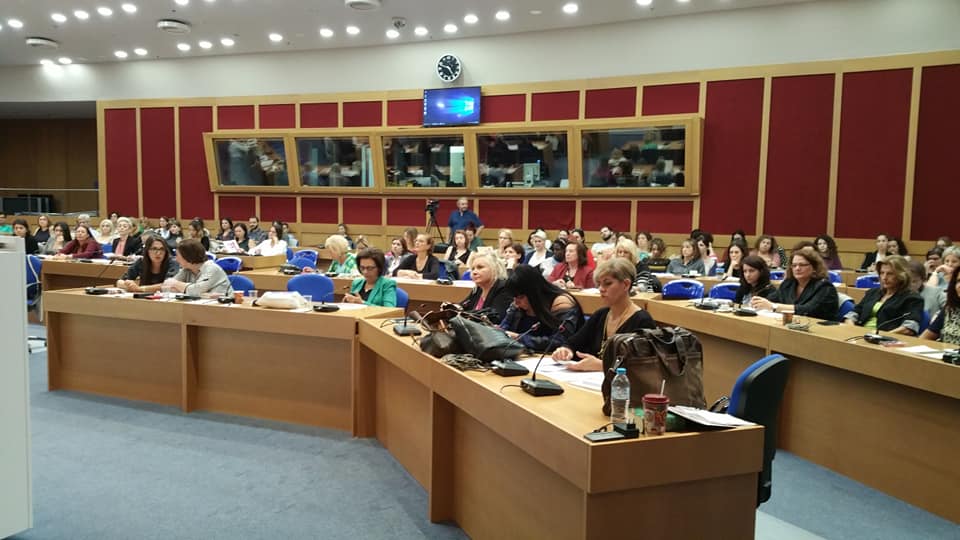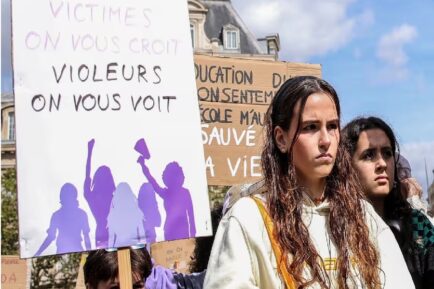The Convention concerns the prevention and combating of violence against women and domestic violence, being an essential tool in promoting gender equality and equal access for women in all spheres of social, economic, and political life.
Greetings
The conference was addressed by Marina Chrysoveloni (Deputy Minister of Interior), Fotini Kouvela (Secretary General for Gender Equality), and Maria Giannaki (Secretary General for Transparency and Human Rights), unanimously stressing “their political will and their unreserved support for the creation of those conditions that will contribute catalytically to the entry into force of the Istanbul Convention in our country, marking the transition from theory to practice”.
Recommendations
The five interesting keynote speeches followed, delivered before a – predominantly – female audience of all ages. Theodora Katsivardakou (lawyer, Head of the Social Protection and Advisory Services Directorate of the GSGE) presented the path to the ratification of the Convention by the Greek state – a course of struggles, pressures, and demands that lasted seven years, from the signing of the Convention by our country (2011).
Mika Ioannidou (lawyer, Head of the Greek Delegation of the European Women’s Lobby) and Maria Skaltsa-Karahaliaou (Vice President of the Hellenic Women Lawyers Association) outlined the important role of civil society organizations in the ratification of the Convention.
Iphigenia Kamtsidou (President of the EKDDA, associate professor of constitutional law) referred to the role of the Legislative Committee, stressing that ratification is a “good practice of how social demands are processed and prepared by the administration, leading to legislation”. Finally, Konstantinos Kondylogiannis (legal advisor of the GSGE) spoke about the importance of this particular state law.
After the main presentations, followed interventions, questions, and statements, which reflected both the public’s undiminished interest in the issue and the formation of a framework for a fruitful dialogue, “the conclusions of which are to be taken into account and evaluated in order to integrate them into gender equality policies”, as the General Secretariat for Gender Equality stresses in a press release.
The intervention of the Diotima Centre
On behalf of the Diotima Centre, interventions were made by Marina Farmakidi and Maria Apostolaki (lawyers of the Centre’s Legal Service), who brought to the fore unseen issues arising from the daily practice of the legal duties of the team.
Marina Farmakidi referred to the emergence of an informal treaty, particularly during the hearing of interim orders, whereby the chairpersons encourage, sometimes forcibly, spouses with children to “get along”.
“In the context of this attitude, petitioning spouses and their attorneys, in litigating temporary custody, relocation, and no-contact orders involving severe incidents of domestic violence, are confronted with an overtly expressed accusation that they ‘did not save their marriage’ or did not do all they could to appease the abusive spouse, before or after the separation, e.g. in exercising his contact with the children.
“With these procedures, a climate of guilt is created because the ‘family affair’ was taken to court when it could have been resolved ‘in the living room or on the steps of the apartment building when the children were handed over”.
“In any case, this logic assumes that the case could be handled simply, thus relegating the stakes of the dignity, mental and physical integrity of the survivor to oblivion, in the name of preserving the family, the ill-conceived interests of the children and the post-marital, supposedly harmonious relationship of the ex-spouses”.
As Marina Farmacidi stressed, these are “anti-procedural and irregular practices”, which should be eliminated.
On the other hand, Maria Apostolaki expressed the satisfaction of the Diotima Centre “for the regulation established by the Istanbul Convention, under which ‘irregular’ migrant women – survivors of gender-based violence, who complain of such acts – are protected from the ‘return decision’.”
She also referred to the importance of training for police authorities, stressing that: “Despite the improvement in the response to incidents of gender-based violence, in recent years, we still see a relative inertia when it comes to female refugee survivors.”
“They are often treated in the context of a ‘cultural’ relativization of violence, which makes it more difficult to refer them to the authorities. Combined with the lack of adequate interpretation, this makes access generally problematic.





